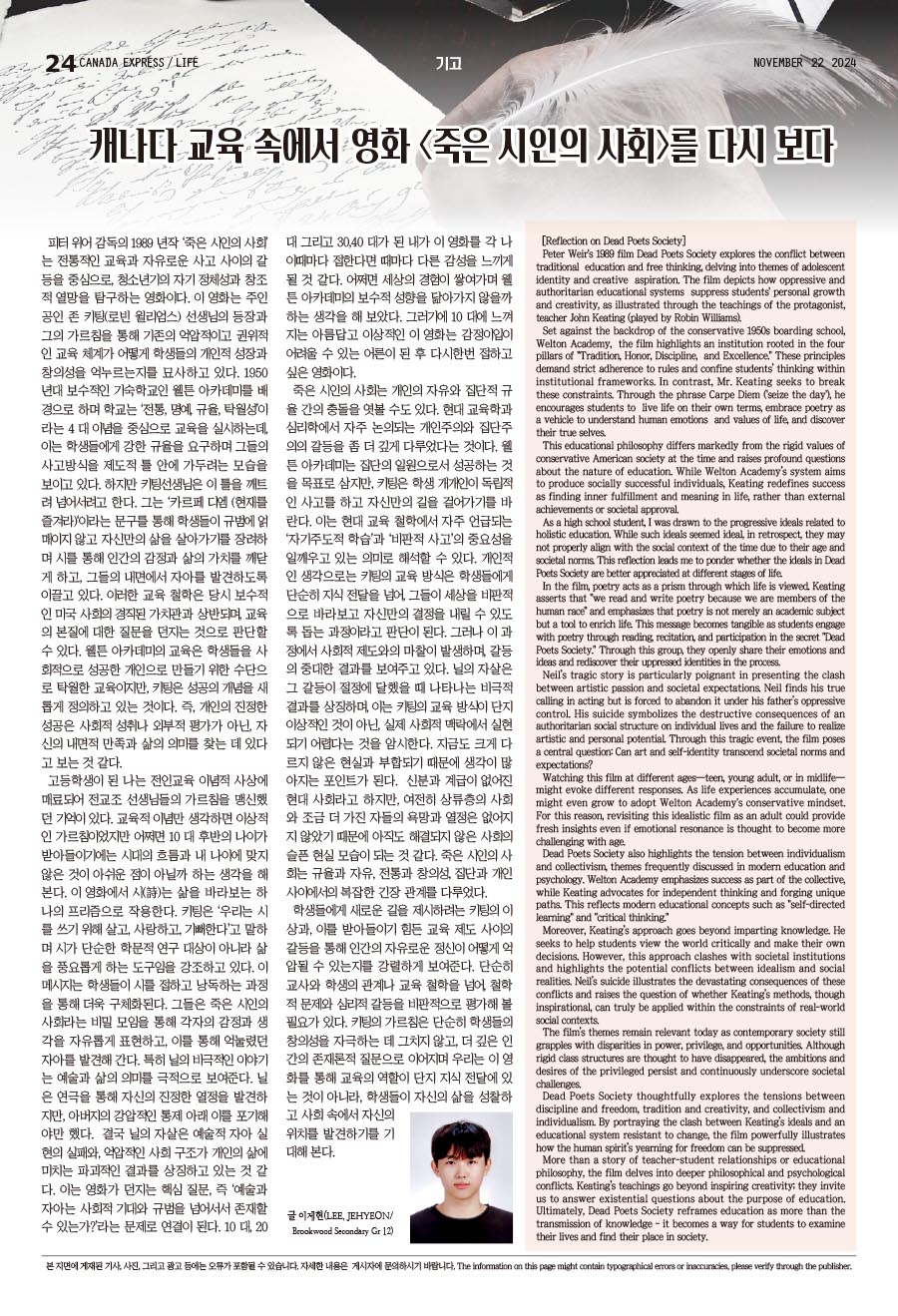
피터 위어 감독의 1989 년작 ‘죽은 시인의 사회’는 전통적인 교육과 자유로운 사고 사이의 갈등을 중심으로, 청소년기의 자기 정체성과 창조적 열망을 탐구하는 영화이다. 이 영화는 주인공인 존 키팅(로빈 윌리엄스) 선생님의 등장과 그의 가르침을 통해 기존의 억압적이고 권위적인 교육 체계가 어떻게 학생들의 개인적 성장과 창의성을 억누르는지를 묘사하고 있다. 1950 년대 보수적인 기숙학교인 웰튼 아카데미를 배경으로 하며 학교는 ‘전통, 명예, 규율, 탁월성’이라는 4 대 이념을 중심으로 교육을 실시하는데, 이는 학생들에게 강한 규율을 요구하며 그들의 사고방식을 제도적 틀 안에 가두려는 모습을 보이고 있다. 하지만 키팅선생님은 이 틀을 깨트려 넘어서려고 한다. 그는 ‘카르페 디엠 (현재를 즐겨라)‘이라는 문구를 통해 학생들이 규범에 얽매이지 않고 자신만의 삶을 살아가기를 장려하며 시를 통해 인간의 감정과 삶의 가치를 깨닫게 하고, 그들의 내면에서 자아를 발견하도록 이끌고 있다. 이러한 교육 철학은 당시 보수적인 미국 사회의 경직된 가치관과 상반되며, 교육의 본질에 대한 질문을 던지는 것으로 판단할 수 있다. 웰튼 아카데미의 교육은 학생들을 사회적으로 성공한 개인으로 만들기 위한 수단으로 탁월한 교육이지만, 키팅은 성공의 개념을 새롭게 정의하고 있는 것이다. 즉, 개인의 진정한 성공은 사회적 성취나 외부적 평가가 아닌, 자신의 내면적 만족과 삶의 의미를 찾는 데 있다고 보는 것 같다.
고등학생이 된 나는 전인교육 이념적 사상에 매료되어 전교조 선생님들의 가르침을 맹신했던 기억이 있다. 교육적 이념만 생각하면 이상적인 가르침이었지만 어쩌면 10 대 후반의 나이가 받아들이기에는 시대의 흐름과 내 나이에 맞지 않은 것이 아쉬운 점이 아닐까 하는 생각을 해 본다. 이 영화에서 시(詩)는 삶을 바라보는 하나의 프리즘으로 작용한다. 키팅은 ‘우리는 시를 쓰기 위해 살고, 사랑하고, 기뻐한다’고 말하며 시가 단순한 학문적 연구 대상이 아니라 삶을 풍요롭게 하는 도구임을 강조하고 있다. 이 메시지는 학생들이 시를 접하고 낭독하는 과정을 통해 더욱 구체화된다. 그들은 죽은 시인의 사회라는 비밀 모임을 통해 각자의 감정과 생각을 자유롭게 표현하고, 이를 통해 억눌렸던 자아를 발견해 간다. 특히 닐의 비극적인 이야기는 예술과 삶의 의미를 극적으로 보여준다. 닐은 연극을 통해 자신의 진정한 열정을 발견하지만, 아버지의 강압적인 통제 아래 이를 포기해야만 했다. 결국 닐의 자살은 예술적 자아 실현의 실패와, 억압적인 사회 구조가 개인의 삶에 미치는 파괴적인 결과를 상징하고 있는 것 같다. 이는 영화가 던지는 핵심 질문, 즉 ‘예술과 자아는 사회적 기대와 규범을 넘어서서 존재할 수 있는가?’라는 문제로 연결이 된다. 10 대, 20 대 그리고 30,40 대가 된 내가 이 영화를 각 나이때마다 접한다면 때마다 다른 감성을 느끼게 될 것 같다. 어쩌면 세상의 경험이 쌓여가며 웰튼 아카데미의 보수적 성향을 닮아가지 않을까 하는 생각을 해 보았다. 그러기에 10 대에 느껴지는 아름답고 이상적인 이 영화는 감정이입이 어려울 수 있는 어른이 된 후 다시한번 접하고 싶은 영화이다.
죽은 시인의 사회는 개인의 자유와 집단적 규율 간의 충돌을 엿볼 수도 있다. 현대 교육학과 심리학에서 자주 논의되는 개인주의와 집단주의의 갈등을 좀 더 깊게 다루었다는 것이다. 웰튼 아카데미는 집단의 일원으로서 성공하는 것을 목표로 삼지만, 키팅은 학생 개개인이 독립적인 사고를 하고 자신만의 길을 걸어가기를 바란다. 이는 현대 교육 철학에서 자주 언급되는 ‘자기주도적 학습’과 ‘비판적 사고’의 중요성을 일깨우고 있는 의미로 해석할 수 있다. 개인적인 생각으로는 키팅의 교육 방식은 학생들에게 단순히 지식 전달을 넘어, 그들이 세상을 비판적으로 바라보고 자신만의 결정을 내릴 수 있도록 돕는 과정이라고 판단이 된다. 그러나 이 과정에서 사회적 제도와의 마찰이 발생하며, 갈등의 중대한 결과를 보여주고 있다. 닐의 자살은 그 갈등이 절정에 달했을 때 나타나는 비극적 결과를 상징하며, 이는 키팅의 교육 방식이 단지 이상적인 것이 아닌, 실제 사회적 맥락에서 실현되기 어렵다는 것을 암시한다. 지금도 크게 다르지 않은 현실과 부합되기 때문에 생각이 많아지는 포인트가 된다. 신분과 계급이 없어진 현대 사회라고 하지만, 여전히 상류층의 사회와 조금 더 가진 자들의 욕망과 열정은 없어지지 않았기 때문에 아직도 해결되지 않은 사회의 슬픈 현실 모습이 되는 것 같다. 죽은 시인의 사회는 규율과 자유, 전통과 창의성, 집단과 개인 사이에서의 복잡한 긴장 관계를 다루었다.
학생들에게 새로운 길을 제시하려는 키팅의 이상과, 이를 받아들이기 힘든 교육 제도 사이의 갈등을 통해 인간의 자유로운 정신이 어떻게 억압될 수 있는지를 강렬하게 보여준다. 단순히 교사와 학생의 관계나 교육 철학을 넘어, 철학적 문제와 심리적 갈등을 비판적으로 평가해 볼 필요가 있다. 키팅의 가르침은 단순히 학생들의 창의성을 자극하는 데 그치지 않고, 더 깊은 인간의 존재론적 질문으로 이어지며 우리는 이 영화를 통해 교육의 역할이 단지 지식 전달에 있는 것이 아니라, 학생들이 자신의 삶을 성찰하고 사회 속에서 자신의 위치를 발견하기를 기대해 본다.
[Reflection on Dead Poets Society]
Peter Weir’s 1989 film Dead Poets Society explores the conflict between traditional education and free thinking, delving into themes of adolescent identity and creative aspiration. The film depicts how oppressive and authoritarian educational systems suppress students’ personal growth and creativity, as illustrated through the teachings of the protagonist, teacher John Keating (played by Robin Williams).
Set against the backdrop of the conservative 1950s boarding school, Welton Academy, the film highlights an institution rooted in the four pillars of “Tradition, Honor, Discipline, and Excellence.” These principles demand strict adherence to rules and confine students’ thinking within institutional frameworks. In contrast, Mr. Keating seeks to break these constraints. Through the phrase Carpe Diem (‘seize the day’), he encourages students to live life on their own terms, embrace poetry as a vehicle to understand human emotions and values of life, and discover their true selves.
This educational philosophy differs markedly from the rigid values of conservative American society at the time and raises profound questions about the nature of education. While Welton Academy’s system aims to produce socially successful individuals, Keating redefines success as finding inner fulfillment and meaning in life, rather than external achievements or societal approval.
As a high school student, I was drawn to the progressive ideals related to holistic education. While such ideals seemed ideal, in retrospect, they may not properly align with the social context of the time due to their age and societal norms. This reflection leads me to ponder whether the ideals in Dead Poets Society are better appreciated at different stages of life.
In the film, poetry acts as a prism through which life is viewed. Keating asserts that “we read and write poetry because we are members of the human race” and emphasizes that poetry is not merely an academic subject but a tool to enrich life. This message becomes tangible as students engage with poetry through reading, recitation, and participation in the secret “Dead Poets Society.” Through this group, they openly share their emotions and ideas and rediscover their uppressed identities in the process.
Neil’s tragic story is particularly poignant in presenting the clash between artistic passion and societal expectations. Neil finds his true calling in acting but is forced to abandon it under his father’s oppressive control. His suicide symbolizes the destructive consequences of an authoritarian social structure on individual lives and the failure to realize artistic and personal potential. Through this tragic event, the film poses a central question: Can art and self-identity transcend societal norms and expectations?
Watching this film at different ages—teen, young adult, or in midlife—might evoke different responses. As life experiences accumulate, one might even grow to adopt Welton Academy’s conservative mindset. For this reason, revisiting this idealistic film as an adult could provide fresh insights even if emotional resonance is thought to become more challenging with age.
Dead Poets Society also highlights the tension between individualism and collectivism, themes frequently discussed in modern education and psychology. Welton Academy emphasizes success as part of the collective, while Keating advocates for independent thinking and forging unique paths. This reflects modern educational concepts such as “self-directed learning” and “critical thinking.”
Moreover, Keating’s approach goes beyond imparting knowledge. He seeks to help students view the world critically and make their own decisions. However, this approach clashes with societal institutions and highlights the potential conflicts between idealism and social realities. Neil’s suicide illustrates the devastating consequences of these conflicts and raises the question of whether Keating’s methods, though inspirational, can truly be applied within the constraints of real-world social contexts.
The film’s themes remain relevant today as contemporary society still grapples with disparities in power, privilege, and opportunities. Although rigid class structures are thought to have disappeared, the ambitions and desires of the privileged persist and continuously underscore societal challenges.
Dead Poets Society thoughtfully explores the tensions between discipline and freedom, tradition and creativity, and collectivism and individualism. By portraying the clash between Keating’s ideals and an educational system resistant to change, the film powerfully illustrates how the human spirit’s yearning for freedom can be suppressed.
More than a story of teacher-student relationships or educational philosophy, the film delves into deeper philosophical and psychological conflicts. Keating’s teachings go beyond inspiring creativity; they invite us to answer existential questions about the purpose of education. Ultimately, Dead Poets Society reframes education as more than the transmission of knowledge – it becomes a way for students to examine their lives and find their place in society.
글 이제현(LEE, JEHYEON/ Brookwood Secondary Gr 12)



